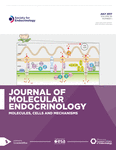Corticotropin-releasing hormone receptors mediate apoptosis via cytosolic calcium-dependent phospholipase A2 and migration in prostate cancer cell RM-1
- Jiangsu Provincial Key Lab of Cardiovascular Diseases and Molecular Intervention, Department of Pharmacology, Nanjing Medical University, Nanjing 210029, China
- Correspondence should be addressed to S Li; Email: snli{at}njmu.edu.cn
Abstract
Peripheral corticotropin-releasing hormone receptors (CRHRs) are G protein-coupled receptors that play different roles depending on tissue types. Previously, we discovered the mechanism of CRHR-mediated apoptosis of mouse prostate cancer cell line (RM-1) to be a change of Bcl-2:Bax ratio, and CRH was found to inhibit transforming growth factor β migration of breast cancer cells via CRHRs. In the present study, we investigated cytosolic calcium-dependent phospholipase A2 (cPLA2) bridging CRHR activations and Bcl-2:Bax ratio and the effect of CRHR activation on cell migration. Silencing of cPLA2 attenuated a CRHR1 agonist, CRH-induced apoptosis, and the decrease of the Bcl-2:Bax ratio, whereas silencing of cPLA2 aggravated CRHR2 agonist, Urocortin 2 (Ucn2)-inhibited apoptosis, and the increase of the Bcl-2:Bax ratio. CRH in a time- and concentration-dependent manner increased cPLA2 expression mainly through interleukin 1β (IL1β) upregulation. Ucn2 decreased cPLA2 expression through neither tumor necrosis factor α nor IL1β. CRH-suppressed decay of cPLA2 mRNA and Ucn2 merely suppressed its production. Overexpression of CRHR1 or CRHR2 in HEK293 cells correspondingly upregulated or downregulated cPLA2 expression after CRH or Ucn2 stimulation respectively. In addition, both CRH and Ucn2 induced migration of RM-1 cells. Our observation not only established a relationship between CRHRs and cell migration but also for the first time, to our knowledge, demonstrated that cPLA2 participates in CRHR1-induced apoptosis and CRHR2-inhibited apoptosis.
- Revision received 14 February 2014
- Accepted 18 February 2014
- © 2014 Society for Endocrinology











